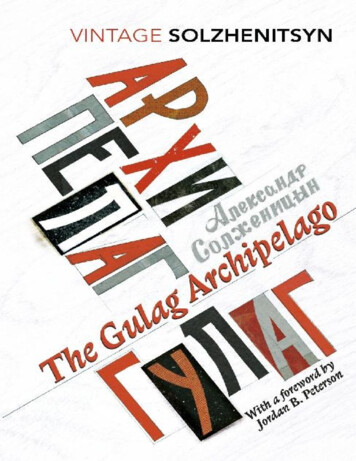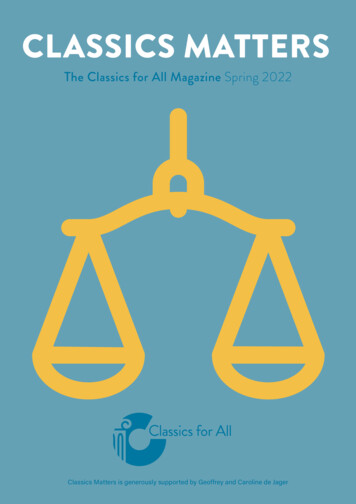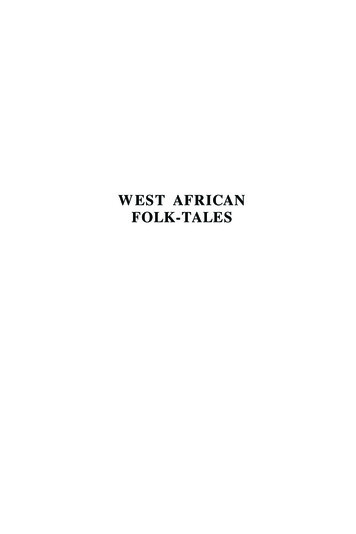
Transcription
ContentsCoverAbout the BookAbout the AuthorAlso by Aleksandr SolzhenitsynMapsDedicationTitle PageForewordForeword to the AbridgmentIntroductionPART IThe Prison Industry1. Arrest2. The History of Our Sewage Disposal System3. The Interrogation4. The Bluecaps5. First Cell, First Love6. That Spring7. In the Engine Room8. The Law as a Child9. The Law Becomes a Man10. The Law Matures11. The Supreme Measure12. TyurzakPART IIPerpetual Motion1. The Ships of the Archipelago2. The Ports of the Archipelago3. The Slave Caravans4. From Island to Island
PART IIIThe Destructive-Labor Camps1. The Fingers of Aurora2. The Archipelago Rises from the Sea3. The Archipelago Metastasizes4. The Archipelago Hardens5. What the Archipelago Stands On6. “The’ve Brought the Fascists!”7. The Way of Life and Customs of the Natives8. Women in Camp9. The Trusties10. In Place of Politicals11. The Loyalists12. Knock, Knock, Knock 13. Hand Over Your Second Skin Too!14. Changing One’s Fate!15. Punishments16. The Socially Friendly17. The Kids18. The Muses in Gulag19. The Zeks as a Nation20. The Dogs’ Service21. Campside22. We Are BuildingPART IVThe Soul and Barbed Wire1. The Ascent2. Or Corruption?3. Our Muzzled FreedomPART VKatorga1. The Doomed2. The First Whiff of Revolution3. Chains, Chains 4. Why Did We Stand For It?5. Poetry Under a Tombstone, Truth Under a Stone6. The Committed Escaper
7. The White Kitten (Georgi Tenno’s Tale)8. Escapes—Morale and Mechanics9. The Kids with Tommy Guns10. Behind the Wire the Ground Is Burning11. Tearing at the Chains12. The Forty Days of KengirPART VIExile1. Exile in the First Years of Freedom2. The Peasant Plague3. The Ranks of Exile Thicken4. Nations in Exile5. End of Sentence6. The Good Life in Exile7. Zeks at LibertyPART VIIStalin Is No More1. Looking Back on It All2. Rulers Change, the Archipelago Remains3. The Law TodayAuthor’s NoteA Note on the Glossary and Name and Place IndexGlossaryAfterwordName and Place IndexThe Russian Social FundCopyright
About the Book WITH A NEW FOREWORD BYJORDAN B. PETERSON‘Solzhenitsyn’s masterpiece The Gulag Archipelago helped create theworld we live in today’ Anne Applebaum A vast canvas of camps, prisons,transit centres and secret police, of informers and spies and interrogators but alsoof everyday heroism, The Gulag Archipelago is Aleksandr Solzhenitsyn’s grandmasterwork. Based on the testimony of some 200 survivors, and on therecollection of Solzhenitsyn’s own eleven years in labour camps and exile, itchronicles the story of those at the heart of the Soviet Union who opposed Stalin,and for whom the key to survival lay not in hope but in despair.A thoroughly researched document and a feat of literary and imaginative power,this edition of The Gulag Archipelago was abridged into one volume at theauthor’s wish and with his full co-operation.‘[The Gulag Archipelago] helped to bring down an empire. Its importancecan hardly be exaggerated’ Doris Lessing, Sunday Telegraph
About the Author Aleksander Solzhenitsyn wasborn in Kislovodsk, Russia, in 1918. He wasbrought up in Rostov, where he graduated inmathematics and physics in 1941. Afterdistinguished service with the Red Army in theSecond World War, he was imprisoned from 1945to 1953 for making unfavourable remarks aboutJoseph Stalin. He was rehabilitated in 1956, butin 1969 he was expelled from the Soviet Writers’Union for denouncing official censorship of hiswork. He was forcibly exiled from the SovietUnion in 1974 and deported to West Germany.Later he settled in America, but after Sovietofficials finally dropped charges against him in1991, he returned to his homeland in 1994 anddied in August 2008, aged eighty-nine.Solzhenitsyn wrote many books, of which OneDay in the Life of Ivan Denisovich, Cancer Wardand The Gulag Archipelago are his best known.
ALSO BY ALEKSANDR SOLZHENITSYNNovels In the First CircleCancer WardThe Red Wheel Stories & Poems One Day in the Life of Ivan DenisovichMatryona’s HomeMiniatures (Prose Poems)The Trail Plays & Screenplays Victory CelebrationsPrisonersThe Love-Girl and the InnocentCandle in the Wind (The Light Which is in Thee)Tanks Know the Truth Memoirs The Oak and the CalfBetween Two Millstones Essays & Speeches One Word of Truth (Nobel Lecture)A World Split Apart (Harvard Address)Letter to the Soviet LeadersRebuilding RussiaThe Russian Question at the End of theTwentieth Century
I dedicate thisto all those who did not liveto tell it.And may they please forgive mefor not having seen it allnor remembered it all,for not having divined all of it.
Foreword Once we have taken up the word, it isthereafter impossible to turn away: A writer isno detached judge of his countrymen andcontemporaries; he is an accomplice to all theevil committed in his country or by his people.And if the tanks of his fatherland have bloodiedthe pavement of a foreign capital, then rustcolored stains have forever bespattered thewriter’s face. And if on some fateful night atrusting Friend is strangled in his sleep—thenthe palms of the writer bear the bruises from thatrope. And if his youthful fellow citizensnonchalantly proclaim the advantages ofdebauchery over humble toil, if they abandonthemselves to drugs, or seize hostages—then thisstench too is mingled with the breath of thewriter. Have we the insolence to declare that wedo not answer for the evils of today’s world? The simple act of an ordinary brave man is not to participate in lies, not tosupport false actions! His rule: Let that come into the world, let it even reignsupreme—only not through me. But it is within the power of writers and artiststo do much more: to defeat the lie! For in the struggle with lies art has always
triumphed and shall always triumph! Visibly, irrefutably for all! Lies can prevailagainst much in this world, but never against art. One word of truth shall outweigh the whole world.–From the speech delivered by Aleksandr Solzhenitsyn to the Swedish Academyon the occasion of his acceptance of the Nobel Prize for Literature First, youdefend your homeland against the Nazis, serving as a twice-decorated soldier onthe Eastern front in the criminally ill-prepared Soviet Red Army. Then, you’rearrested, humiliated, stripped of your military rank, charged under the auspicesof the all-purpose Article 58 with the dissemination of “anti-Soviet propaganda,”and dragged off to Moscow’s infamous Lubyanka prison. There, through the barsof your cell, you watch your beloved country celebrating its victory in the GreatPatriotic War. Then you’re sentenced, in absentia, to eight years of hard labor(but you got away easy; it wasn’t so long afterward that people in your positionwere awarded a “tenner”—and then a quarter of a century!). And fate isn’tfinished with you, yet—not by any means. You develop a deadly cancer in thecamp, endure the exile imposed on you after your imprisonment ends, and passvery close to death.Despite all this, you hold your head high. You refuse to turn against man orGod, although you have every reason to do so. You write, instead, secretly, atnight, documenting your terrible experiences. You craft a personal memoir—asingle day in the labor camps—and, miracle of miracles! The clouds part! Thesun shines through! Your book is published, and in your own country! It meetswith unparalleled acclaim, nationally and internationally. But the sky darkens,once again, and the sun disappears. The repression returns. You become (onceagain) a “non-person.” The secret police—the dread KGB—seize the manuscriptof your next book. It sees the light of day, nonetheless; but only in the West.There, your reputation grows beyond the wildest of imaginings. The NobelCommittee itself bestows upon you its highest literary honor.The Soviet authorities, stripped of their camouflage, are enraged. They orderthe secret police to poison you. You pass (once again) near death. But youcontinue to write: driven, solitary, intolerably inspired. Your The GulagArchipelago documents the absolute and utter corruption of the dogmas anddoctrines of your state, your empire, your leaders—and yourself. And then: thatis printed, too! Not in your own country, but in the West—once again—fromcopies oh-so-dangerously hidden, and smuggled across the borders. And yourgreat book bursts with unparalleled and dreadful force into the still-naïve and
unexpecting literary and intellectual world. You are expelled from the SovietUnion, stripped of your citizenship, forced to take residency in a society bothstrange to you and resistant, in its own way, to your prophetic words. But thepower of your stories and the strength of your morals demolish any remainingclaims to ethical and philosophical credibility still made by the defenders of thecollectivist system that gave rise to all that you witnessed.Years pass (but not so many, from the perspective of history). Then? Anothermiracle! The Soviet Union collapses! You return home. Your citizenship isrestored. You write and speak in your reclaimed homeland until death claimsyou, in 2008. A year later The Gulag Archipelago is deemed mandatory readingby those responsible for establishing the national school curriculum of yourhome country. Your impossible victory is complete.The three volumes of The Gulag Archipelago—one continuous, extended screamof outrage—are, paradoxically, brilliant, bitter, disbelieving, and infused withawe: awe at the strength characterizing the best among us, in the worst of allsituations. In that monumental text, published in 1973, Aleksandr Solzhenitsynconducted “an experiment in literary investigation”—a hybrid of journalism,history, and biography, unlike anything ever written before or since. In 1985, theauthor bestowed his approval upon Edward E. Ericson, Jr’s single-volumeabridgement—republished here, on the fiftieth anniversary of the completion ofthe full three-volume edition and centenary of the author’s birth—and sold somethirty million copies, in thirty-five languages. Between the pages ofSolzhenitsyn’s book—apart from the documentation of the horrors of the legionsof the dead, counted and uncounted, and the masses whose lives were tornasunder—are the innumerable soul-chilling personal stories, carefully preserved,making the tragedy of mass betrayal, torture and death not the mere statisticStalin so disdainfully described but individual, real and terrible.It is a matter of pure historical fact that The Gulag Archipelago played aprimary role in bringing the Soviet Empire to its knees. Although economicallyunsustainable, ruled in the most corrupt manner imaginable, and reliant on theslavery and enforced deceit of its citizens, the Soviet system managed to stumbleforward through far too many decades before being cut to the quick. Thecourageous leaders of the labor unions in Poland, the great Pope John Paul II andthe American President Ronald Reagan, with his blunt insistence that the Westfaced an evil empire, all played their role in its defeat and collapse. It wasSolzhenitsyn, however, whose revelations made it positively shameful to defendnot just the Soviet state, but the very system of thought that made that state whatit was. It was Solzhenitsyn who most crucially made the case that the terrible
excesses of Communism could not be conveniently blamed on the corruption ofthe Soviet leadership, the “cult of personality” surrounding Stalin, or the failureto put the otherwise stellar and admirable utopian principles of Marxism intoproper practice. It was Solzhenitsyn who demonstrated that the death of millionsand the devastation of many more were, instead, a direct causal consequence ofthe philosophy (worse, perhaps: the theology) driving the Communist system.The hypothetically egalitarian, universalist doctrines of Karl Marx containedhidden within them sufficient hatred, resentment, envy and denial of individualculpability and responsibility to produce nothing but poison and death whenmanifested in the world.For Marx, man was a member of a class, an economic class, a group—that,and little more—and history nothing but the battleground of classes, of groups.His admirers regarded (continue to regard) Marx’s doctrine as one ofcompassion—moral by definition, virtuous by fiat: “consider the workingclasses, in all their oppression, and work forthrightly to free them.” But hate maywell be a stronger and more compelling motivator than love. In consequence, ittook no time, in the aftermath of the Russian Revolution, for solidarity with thecommon man and the apparently laudable demand for universal equality tomanifest its unarticulated and ever-darkening shadow. First came the most brutalindictment of the “class enemy” Then came the ever-expanding definition of thatenemy, until every single person in the entirety of the state found him or herselfat risk of encapsulation within that insatiable and devouring net. The verdict,delivered to those deemed at fault, by those who elevated themselves to thesimultaneously held positions of judge, jury and executioner? The necessity toeradicate the victimizers, the oppressors, in toto, without any considerationwhatsoever for reactionary niceties—such as individual innocence.Let us note, as well: this outcome wasn’t the result of the initially pristineMarxist doctrine becoming corrupt over time, but something apparent andpresent at the very beginning of the Soviet state itself. Solzhenitsyn cites, forexample, one Martin Latsis, writing for the newspaper Red Terror, November 1,1918: “We are not fighting against single individuals. We are exterminating thebourgeoisie as a class. It is not necessary during the interrogation to look forevidence proving that the accused opposed the Soviets by word or action. Thefirst question you should ask him is what class does he belong to, what is hisorigin, his education and his profession. These are the questions that willdetermine the fate of the accused. Such is the sense and essence of red terror.” Itis necessary to think when you read such a thing, to meditate long and hard onthe message. It is necessary to recognize, for example, that the writer believedthat it would be better to execute ten thousand potentially innocent individuals
than to allow one poisonous member of the oppressor class to remain free. It isequally necessary to pose the question: “Who, precisely, belonged to thathypothetical entity, ‘the bourgeoisie’?” It is not as if the boundaries of such acategory are self-evident, there for the mere perceiving. They must be drawn.But where, exactly? And, more importantly, by whom—or by what? If it’s hateinscribing the lines, instead of love, they will inevitably be drawn so that thelowest, meanest, most cruel and useless of the conceptual geographers will bejustified in manifesting the greatest possible evil, and producing the greatestpossible misery.Members of the bourgeoisie? Beyond all redemption! They had to go, as amatter of course! What of their wives? Children? Even—their grandchildren?Off with their heads, too! All were incorrigibly corrupted by their class identity,and their destruction therefore ethically necessitated. How convenient, that thedarkest and direst of all possible motivations could be granted the highest ofmoral standings! That was a true marriage of Hell and of Heaven. What values,what philosophical presumptions, truly dominated, under such circumstances?Was it desire for brotherhood, dignity, and freedom from want? Not in the least—not given the outcome. It was instead and obviously the murderous rage ofhundreds of thousands of biblical Cains, each looking to torture, destroy andsacrifice their own private Abels. There is simply no other manner of accountingfor the corpses.What can be concluded in the deepest, most permanent sense, fromSolzhenitsyn’s anguished Gulag narrative? First, we learn what is indisputable—what we all should have learned by now (what we have nonetheless failed tolearn): that the Left, like the Right, can go too far; that the Left has, in the past,gone much too far. Second, we learn what is far more subtle and difficult—howand why that going too far occurs. We learn, as Solzhenitsyn so profoundlyinsists, that the line dividing good and evil cuts through the heart of every humanbeing. And we learn, as well, that we all are, each of us, simultaneouslyoppressor and oppressed. Thus, we come to realize that the twin categories of“guilty oppressor” and “justice-seeking victim” can be made endlessly inclusive.This is not least because we all benefit unfairly (and are equally victimized) byour thrownness, our arbitrary placement in the flow of time. We all accrueundeserved and somewhat random privilege from the vagaries of our place ofbirth, our inequitably distributed talents, our ethnicity, race, culture and sex. Weall belong to a group—some group—that has been elevated in comparativestatus, through no effort of our own. This is true in some manner, along somedimension of group category, for every solitary individual, except for the singlemost lowly of all. At some time and in some manner we all may in consequence
be justly targeted as oppressors, and may all, equally, seek justice—or revenge—as victims. Even if the initiators of the revolution had, therefore, in their mostpure moments, been driven by a holy desire to lift up the downtrodden, was itnot guaranteed that they would be overtaken by those motivated primarily byenvy, hate and the desire to destroy as the revolution progressed?Hence the establishment of the hungrily growing and most often fatal list ofclass enemies, right from the very first moments of the Communist revolution.The demolition was aimed first at the students, the religious believers and thesocialists (continuing, under Stalin, with the old revolutionaries themselves), andwas followed soon thereafter by the annihilation of the successful peasant farmer“kulaks.” And this appetite for destruction wasn’t of the type to be satiated withthe bodies of the perpetrators themselves. As Solzhenitsyn writes, “they burnedout whole nests, whole families, from the start; and they watched jealously to besure that none of the children—fourteen, ten, even six years old—got away: tothe last scrapings, all had to go down the same road, to the same commondestruction.” This was driven by the perceived—even self-perceived—guilt ofall. How else was it possible for the hundreds of thousands or perhaps evenmillions of informants, prosecutors, betrayers and unforgivably mute observersto spring so rapidly into being in the tumult of the Red Terror?Thus the doctrine of group identity inevitably ends with everyone identified asa class enemy, an oppressor; with everyone uncleansibly contaminated bybourgeois privilege, unfairly enjoying the benefits bequeathed by the vagaries ofhistory; with everyone prosecuted, without respite, for that corruption andinjustice. “No mercy for the oppressor!” And no punishment too severe for thecrime of exploitation! Expiation becomes impossible because there is noindividual guilt, no individual responsibility, and therefore no manner in whichthe crime of arbitrary birth can be individually accounted for. And all the miserythat can be generated as a consequence of such an accusation is the true reasonfor the accusation. When everyone is guilty, all that serves justice is thepunishment of everyone; when the guilt extends to the existence of the world’smisery itself, only the fatal punishment will suffice.It is much more preferable, instead—and much more likely to preserve us allfrom metastasizing hells—to state forthrightly: “I am indeed thrown arbitrarilyinto history. I therefore choose to voluntarily shoulder the responsibility of myadvantages and the burden of my disadvantages—like every other individual. Iam morally bound to pay for my advantages with my responsibility. I ammorally bound to accept my disadvantages as the price I pay for being. I willtherefore strive not to descend into bitterness and then seek vengeance because Ihave less to my credit and a greater burden to stumble forward with than others.”
Is this not a or even the essential point of difference between the West, for allits faults, and the brutal, terrible “egalitarian” systems generated by thepathological Communist doctrine? The great and good framers of the Americanrepublic were, for example, anything but utopian. They took full stock and fullmeasure of ineradicable human imperfection. They held modest goals, derivednot least from the profoundly cautious common-law tradition of England. Theyendeavored to establish a system the corrupt and ignorant fools we all are couldnot damage too fatally. That’s humility. That’s clear-headed knowledge of thelimitations of human machination and good intention.But the Communists, the revolutionaries? They aimed, grandly and admirably,at least in theory, at a much more heavenly vision—and they began their pursuitwith the hypothetically straightforward and oh-so-morally-justifiableenforcement of economic equality. Wealth, however, was not so easilygenerated. The poor could not so simply become rich. But the riches of thosewho had anything more than the greatest pauper (no matter how pitiful that“more” was)? That could be “redistributed”—or, at least, destroyed. That’sequality, too. That’s sacrifice, in the name of Heaven on Earth. Andredistribution was not enough—with all its theft, betrayal and death. Mereeconomic engineering was insufficient. What emerged, as well, was theoverarching and truly totalitarian desire to remake man and woman, as such—the longing to restructure the human spirit in the very image of the Communistpreconceptions. Attributing to themselves this divine ability, this transcendentwisdom—and with unshakable belief in the glowing but ever-receding future—the newly-minted Soviets tortured, thieved, imprisoned, lied and betrayed, all thewhile masking their great evil with virtue. It was Solzhenitsyn and The GulagArchipelago that tore off the mask, and exposed the feral cowardice, envy,deceit, resentment, and hatred for the individual and for existence itself thatpulsed beneath.Others had made the attempt. Malcolm Muggeridge reported on the horrors of“dekulakization”—the forced collectivization of the all-too-recently successfulpeasantry of the Ukraine and elsewhere that preceded the horrifying famines ofthe 1930s. In the same decade, and in the following years, George Orwell riskedhis ideological commitments and his reputation to tell us all what was trulyoccurring in the Soviet Union in the name of egalitarianism and brotherhood.But it was Solzhenitsyn who truly shamed the radical leftists, forcing themunderground (where they have festered and plotted for the last forty years,failing unforgivably to have learned what all reasonable people should havelearned from the cataclysm of the twentieth century and its egalitarianutopianism). And today, despite everything, and under their sway—almost three
decades since the fall of the Berlin Wall and the apparent collapse ofCommunism—we are doing everything we can to forget what Solzhenitsyn soclearly demonstrated, to our great and richly deserved peril. Why don’t all ourchildren read The Gulag Archipelago in our high schools, as they now do inRussia? Why don’t our teachers feel compelled to read the book aloud? Did wenot win the Cold War? Were the bodies not piled high enough? (How high, then,would be enough?) Why, for example, is it still acceptable—and in politecompany—to profess the philosophy of a Communist or, if not that, to at leastadmire the work of Marx? Why is it still acceptable to regard the Marxistdoctrine as essentially accurate in its diagnosis of the hypothetical evils of thefree-market, democratic West; to still consider that doctrine “progressive,” andfit for the compassionate and proper thinking person? Twenty-five million deadthrough internal repression in the Soviet Union (according to The Black Book ofCommunism). Sixty million dead in Mao’s China (and an all-too-likely return toautocratic oppression in that country in the near future). The horrors ofCambodia’s Killing Fields, with their two million corpses. The barely animatebody politic of Cuba, where people struggle even now to feed themselves.Venezuela, where it has now been made illegal to attribute a child’s death inhospital to starvation. No political experiment has ever been tried so widely, withso many disparate people, in so many different countries (with such differenthistories) and failed so absolutely and so catastrophically. Is it mere ignorance(albeit of the most inexcusable kind) that allows today’s Marxists to flaunt theircontinued allegiance—to present it as compassion and care? Or is it, instead,envy of the successful, in near-infinite proportions? Or something akin to hatredfor mankind itself? How much proof do we need? Why do we still avert our eyesfrom the truth?Perhaps we simply lack sophistication. Perhaps we just can’t understand.Perhaps our tendency toward compassion is so powerfully necessary in theintimacy of our families and friendships that we cannot contemplate itslimitations, its inability to scale, and its propensity to mutate into hatred of theoppressor, rather than allegiance with the oppressed. Perhaps we cannotcomprehend the limitations and dangers of the utopian vision given our definiteneed to contemplate and to strive for a better tomorrow. We certainly don’t seemto imagine, for example, that the hypothesis of some state of future perfection—for example, the truly egalitarian and permanent brotherhood of man—can beused to justify any and all sacrifices whatsoever (the pristine and heavenly endmaking all conceivable means not only acceptable but morally required). Thereis simply no price too great to pay in pursuit of the ultimate utopia. (This isparticularly true if it is someone else who foots the bill.) And it is clearly the
case that we require a future toward which to orient ourselves—to providemeaning in our life, psychologically speaking. It is for that reason we see thesame need expressed collectively, on a much larger scale, in the Judeo-Christianvision of the Promised Land, and the Kingdom of Heaven on Earth. And it isalso clearly the case that sacrifice is necessary to bring that desired end state intobeing. That’s the discovery of the future itself: the necessity to foregoinstantaneous gratification in the present, to delay, to bargain with fate so that thefuture can be better; twinned with the necessity to let go, to burn off, to separatewheat from chaff, and to sacrifice what is presently unworthy, so that tomorrowcan be better than today. But limits need to be placed around who or what isdeemed dispensable.And it is exactly the necessity for interminable sacrifice that constitutes theterrible counterpart of the utopian vision. “Heaven is worth any price”—but whopays? Christianity solved that problem by insisting on the sacrifice of the self;insisting that the suffering and malevolence of the world is the responsibility ofeach individual; insisting that each of us sacrifice what is unworthy andunnecessary and resentful and deadly in our characters (despite the pain of suchsacrifice) so that we could stumble properly uphill under our respective andvoluntarily-shouldered existential burdens. But it was and is the opinion of thematerialist utopians that someone else be sacrificed, so that Heaven itself mightbe attained; some perpetrator, or victimizer, or oppressor, or member of aprivileged group. A cynic might be forgiven, in consequence, for asking: “Is itthe City of God that is in fact the aim? Or is the true aim the desire to make aburning sacrificial pyre of everyone and everything, and the hypothesis of thecoming brotherhood of man merely the cover story, the camouflage?” Perhaps itis precisely the horror that is the point, and not the utopia. It is far from obviousin such situations just what is horse and what is cart. It is precisely in theaftermath of the death of 100 million people or more that such dark questionsmust be asked. And we should also note that the utopian vision, dressed as it isinevitably in compassion, is a temptation particularly difficult to resist, and maytherefore offer a particularly subtle and insidious justification for mayhem.Here’s some thoughts—no, some facts. Every social system producesinequality, at present, and every social system has done so, since the beginningof time. The poor have been with us—and will be with us—always. Analysis ofthe content of individual Paleolithic gravesites provides evidence for theexistence of substantive variance in the distribution of ability, privilege, andwealth, even in our distant past. The more illustrious of our ancestors wereburied with great possessions, hoards of precious metals, weaponry, jewelry, andcostuming. The majority, however, struggled through their lives, and were buried
with nothing. Inequality is the iron rule, even among animals, with their intensecompetition for quality living space and reproductive opportunity—even amongplants, and cities—even among the stellar lights that dot the cosmos themselves,where a minority of privileged and oppressive heavenly bodies contain the massof thousands, millions or even billions of average, dispossessed planets.Inequality is the deepest of problems, built into the structure of reality itself, andwill not be solved by the presumptuous, ideology-inspired retooling of the rarefree, stable and productive democracies of the world. The only systems that haveproduced some modicum of wealth, along with the inevitable inequality and itsattendant suffering, are those that evolved in the West, with their roots in theJudeo-Christian tradition; precisely those systems that emphasize above all theessential dignity, divinity and ultimate responsibility of the individual. Inconsequence, any attempt to attribute the existence of inequality to thefunctioning of the productive institutions we have managed to create and protectso r
1. The Fingers of Aurora 2. The Archipelago Rises from the Sea 3. The Archipelago Metastasizes 4. The Archipelago Hardens 5. What the Archipelago Stands On 6. "The've Brought the Fascists!" 7. The Way of Life and Customs of the Natives 8. Women in Camp 9. The Trusties 10. In Place of Politicals 11. The Loyalists 12. Knock, Knock, Knock 13.










